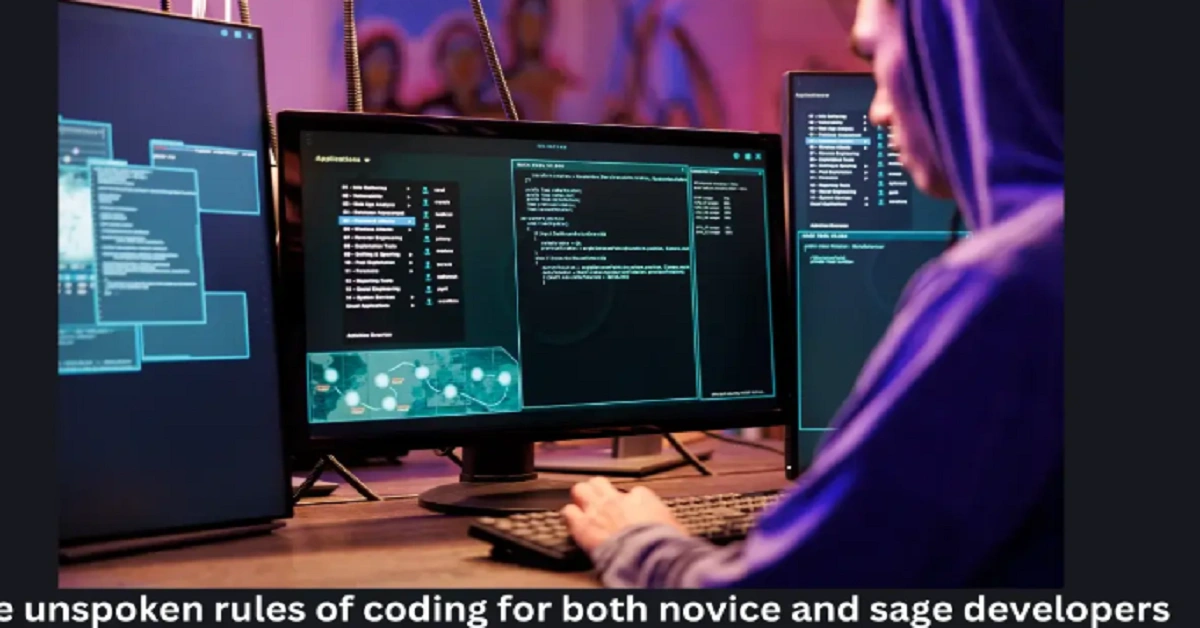Introduction
Coding is not just about writing lines of code that work; it’s an art, a discipline, and a journey of continuous learning. Whether you’re a novice just dipping your toes into the vast ocean of programming or a seasoned sage navigating the intricate waters of software development, certain unspoken rules bind us all. Understanding these rules can help the unspoken rules of coding for both novice and sage developers write better code, collaborate effectively, and grow professionally.
Rule #1: Write Readable Code
Novice Perspective
As a beginner, it’s tempting to write code that merely works. However, writing readable code is just as important. Use clear variable names, consistent indentation, and comments to explain why you did something unusual or complex.
Example:
# Bad Practice
def calc(x, y):
return x * y / 2
# Good Practice
def calculate_triangle_area(base, height):
return base * height / 2Sage Perspective
Readable code becomes paramount in large-scale projects where multiple the unspoken rules of coding for both novice and sage developers work together. Adhere to coding standards and use tools like linters to enforce code style. Remember, code is read more often than it is written.
Rule #2: Embrace Version Control
Novice Perspective
Start using Git or any version control system (VCS) early. Even for personal projects, version control helps you track changes, experiment safely, and recover from mistakes.
Example:
# Initialize a new Git repository
$ git init
# Commit your changes
$ git add .
$ git commit -m "Initial commit"Sage Perspective
For experienced developers, version control is indispensable. Follow branching strategies like GitFlow or trunk-based development. Always write meaningful commit messages and conduct thorough code reviews.
Rule #3: Debugging is an Art
Novice Perspective
Debugging can feel daunting, but it’s a skill that improves with practice. Learn to use debugging tools in your IDE, add meaningful print statements, or use logging frameworks.
Sage Perspective
Seasoned the unspoken rules of coding for both novice and sage developers approach debugging systematically. Understand the problem, reproduce it consistently, and isolate the root cause. Avoid patching symptoms without addressing underlying issues.
Rule #4: Don’t Reinvent the Wheel
Novice Perspective
Use existing libraries and frameworks when they suit your needs. Familiarize yourself with official documentation to leverage these tools effectively.
Sage Perspective
While using libraries, evaluate their reliability, performance, and long-term viability. Contribute back to open-source projects when possible, strengthening the ecosystem.
Rule #5: Comment Smartly
Novice Perspective
Comments should explain the “why,” not the “what” of your code. Avoid redundant comments.
Example:
# Bad Comment
x = x + 1 # Increment x by 1
# Good Comment
x = x + 1 # Adjust for off-by-one error in calculationSage Perspective
For experienced developers, maintain a balance. Write inline comments for complex logic and comprehensive docstrings for functions, classes, and modules. Keep documentation updated as the code evolves.
Rule #6: Test, Test, Test
Novice Perspective
Writing tests may seem unnecessary at first, but they prevent regressions and ensure your code behaves as expected. Start with simple unit tests.
Example:
import unittest
def add(a, b):
return a + b
class TestMathOperations(unittest.TestCase):
def test_add(self):
self.assertEqual(add(2, 3), 5)
if __name__ == "__main__":
unittest.main()Sage Perspective
Experienced the unspoken rules of coding for both novice and sage developers adopt a test-driven development (TDD) approach and write integration, regression, and performance tests. Use CI/CD pipelines to automate testing and ensure code stability.
Rule #7: Learn to Read Documentation
Novice Perspective
Develop the habit of reading official documentation. It’s often the most accurate and comprehensive source of information.
Sage Perspective
For advanced developers, contribute to documentation where it’s lacking. Your expertise can help others learn and grow.
Rule #8: Communication is Key
Novice Perspective
Ask questions when you’re stuck, but frame them well. Provide context, show what you’ve tried, and explain the problem.
Example:
“I’m trying to implement a sorting algorithm, but my solution doesn’t handle negative numbers. Here’s my code and the output I’m getting.”
Sage Perspective
For experienced developers, mentorship and collaboration are critical. Explain concepts clearly, provide constructive feedback, and foster a culture of mutual learning.
Rule #9: Keep Learning
Novice Perspective
Programming languages, tools, and paradigms evolve rapidly. Keep exploring new concepts and practice regularly.
Sage Perspective
Even as an expert, there’s always more to learn. Stay updated with industry trends, attend conferences, and refine your skills in emerging technologies.
Rule #10: Respect Deadlines Without Sacrificing Quality
Novice Perspective
Learn to estimate the time required for tasks. Avoid overpromising, and focus on delivering functional code on time.
Sage Perspective
Balance speed with quality. Technical debt is inevitable but should be manageable. Communicate effectively with stakeholders about progress and potential delays.
Conclusion
The unspoken coding rules for novice and sage developers is a craft honed over years of practice, feedback, and collaboration. By embracing these unspoken rules, developers—whether novices or sages—can navigate software development challenges with grace and efficiency. Remember, the journey is as rewarding as the destination.
